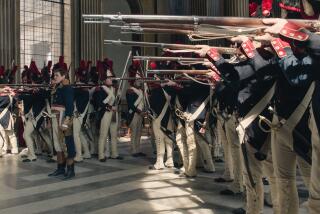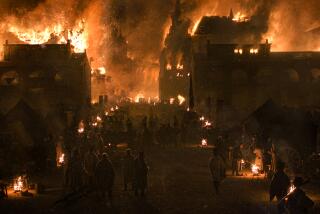Napoleon’s Blunders
- Share via
TORONTO — In my high school music appreciation class, we listened to Tchaikovsky’s “1812 Overture”. We liked it, because there was stuff we could identify: Cannons boomed, bells rang, national anthems resounded and there was a satisfying uproar at the end.
The English -- being English -- have since produced a version performed by sheep and chickens. Generals screw up, their fiascoes get made into art and then the art gets made into fiascoes. Such is the march of progress.
We were told that Tchaikovsky’s piece celebrated Napoleon’s retreat from Moscow, but we weren’t told who Napoleon was or what he was doing in Moscow in the first place. So, in case you had a similarly vague musical appreciation experience, here’s the deep background.
Napoleon was a brilliant soldier who rose like a bubble during a time of unrest and bloodletting, won many battles and was thus able -- like Julius Caesar -- to grab near-absolute power. He got hold of Italy and Austria and Prussia and Spain. He replaced the French Republic with an emperor -- himself -- thus giving rise to much impressive furniture with eagles and columns on it. He also brought in a legal code, still somewhat admired today.
He had laudable motives, or so his spin-doctoring went: He wanted peace and justice and European unity. But he thought it would be liberating for other countries to have their stifling religious practices junked and their political systems replaced with one like his. To this end, he scrapped the kings of other countries and created new kings, who happened to be members of his own family.
Which brings me to Napoleon’s two biggest mistakes. The first was Spain. Napoleon got Spain treacherously. He had an agreement whereby he could march through it on the way to Portugal, which was bothering him by interfering with his sanctions against trading with the British. Once his armies were in Spain he took the place over, whereupon his forces engaged in their usual practices of priest-pestering, church-looting and removing sparkly things and artworks to other locations for safekeeping.
Napoleon’s big mistake was underestimating the religious feelings of the staunchly Roman Catholic Spanish. He thought they’d embrace “liberation,” but it seems they had a curious attachment to their own beliefs. The British annoyed Napoleon in Spain by winning battles against him, but the real defeat of the French was brought about by widespread guerrilla resistance.
Things got very nasty on both sides: The Spaniards cut French throats, the French roasted Spaniards alive, the Spaniards sawed a French general in two. The Spanish population won -- although at enormous cost -- because you can kill some of the people all of the time and you can kill all of the people some of the time but you can’t kill all of the people all of the time. When a whole population hates you, and hates you fanatically, it’s difficult to rule.
Present leaders, take note: Never underestimate the power of religious fervor. Also: Your version of what’s good for them may not match theirs.
Napoleon’s second big mistake was invading Russia. There’s no one clear explanation for this. He didn’t need to do it. Russia wasn’t attacking him, though it had in the past and might in the future. Maybe he just wanted to add it to his set. In any case, he invaded. When his horse stumbled as he crossed the Dnieper -- a bad omen -- a voice said from the shadows: “A Roman would have turned back.”
Warfare at that time meant forcing your opponent to stand and fight, resulting in victory on one side or the other. But the Russians merely retreated, burning crops as they went and leading Napoleon deeper and deeper into the same huge Russian landmass and awful Russian weather that also defeated Hitler.
When Napoleon reached Moscow, he thought maybe he’d “won,” but the Russians burned Moscow and retreated again. Napoleon hung around the cinders, expecting the czar to sue for peace, but no message arrived. Thus the retreat, the “1812 Overture” and the decimation of the Grand Army. As others have learned since, it’s very hard to defeat an enemy who never turns up.
The occupation of Japan after the Second World War has been proposed as a model for Iraq. It’s not a helpful comparison.
First, the religious fervor of the Japanese soldier was attached to the emperor, who thus had the power to order a surrender. Iraq will have no such single authority. Second, Japan is an island: No Russian-style, Afghan-style retreat was possible. Third, the Japanese had no neighbors who shared their religious views and might aid them. They had only two choices: death or democracy.
Iraq on the other hand has many coreligionist neighbors who will sympathize with it, however repugnant they’ve previously found Hussein. A foreign occupation -- not immediately, but in the long run -- is less likely to resemble MacArthur in Japan than Napoleon in Spain.
Now you know about the “1812 Overture”. That moment -- after which Napoleon plummeted and the French Empire dissolved -- was the hinge on which the rest of the 19th century turned, as the First World War was the hinge for the 20th. When a door swings open, you never know what will come through it. And as Napoleon himself believed, the fortunes of war, being notoriously unpredictable, are ruled by the Goddess of Chance.
This article also ran in the British newspaper the Independent.


